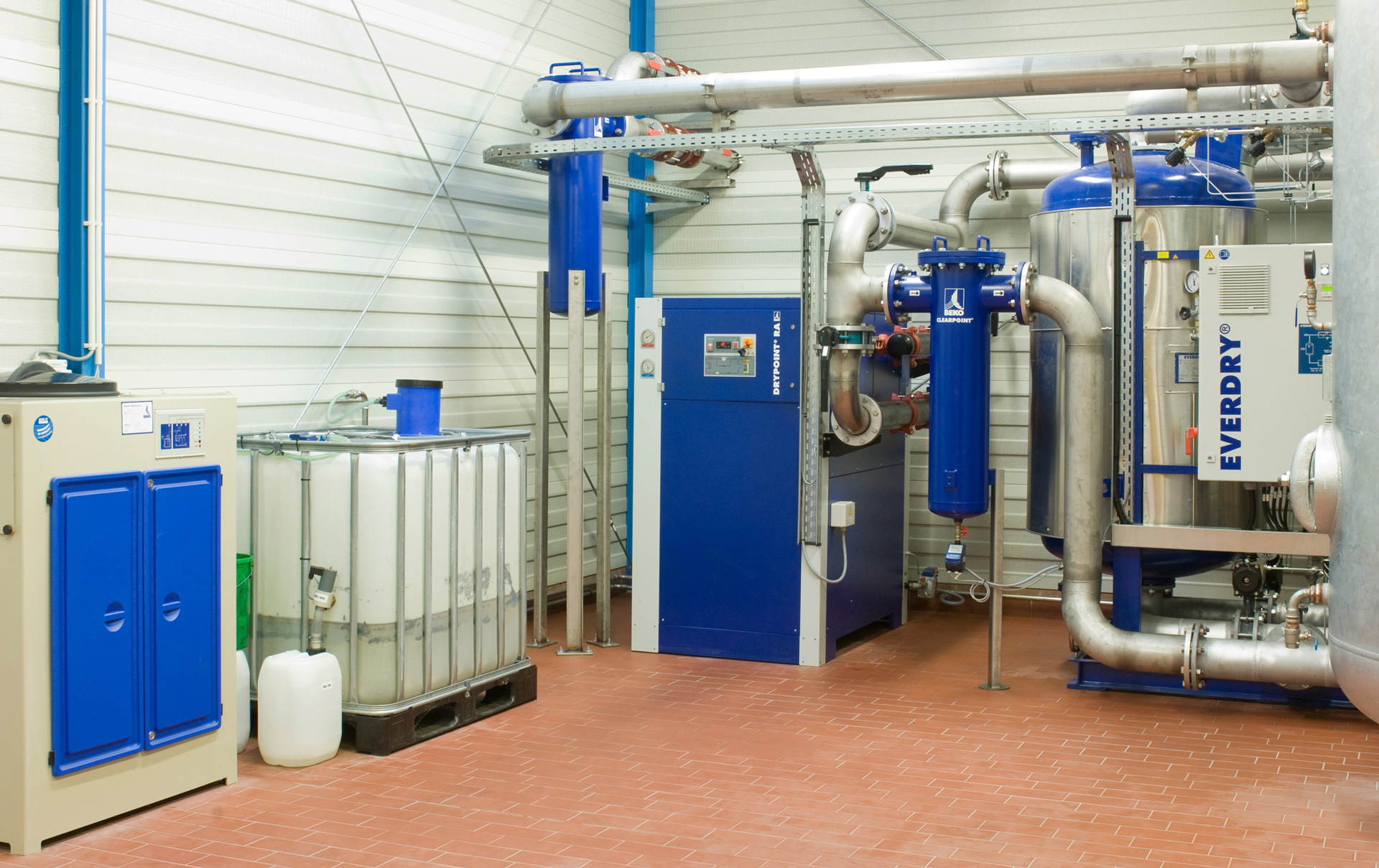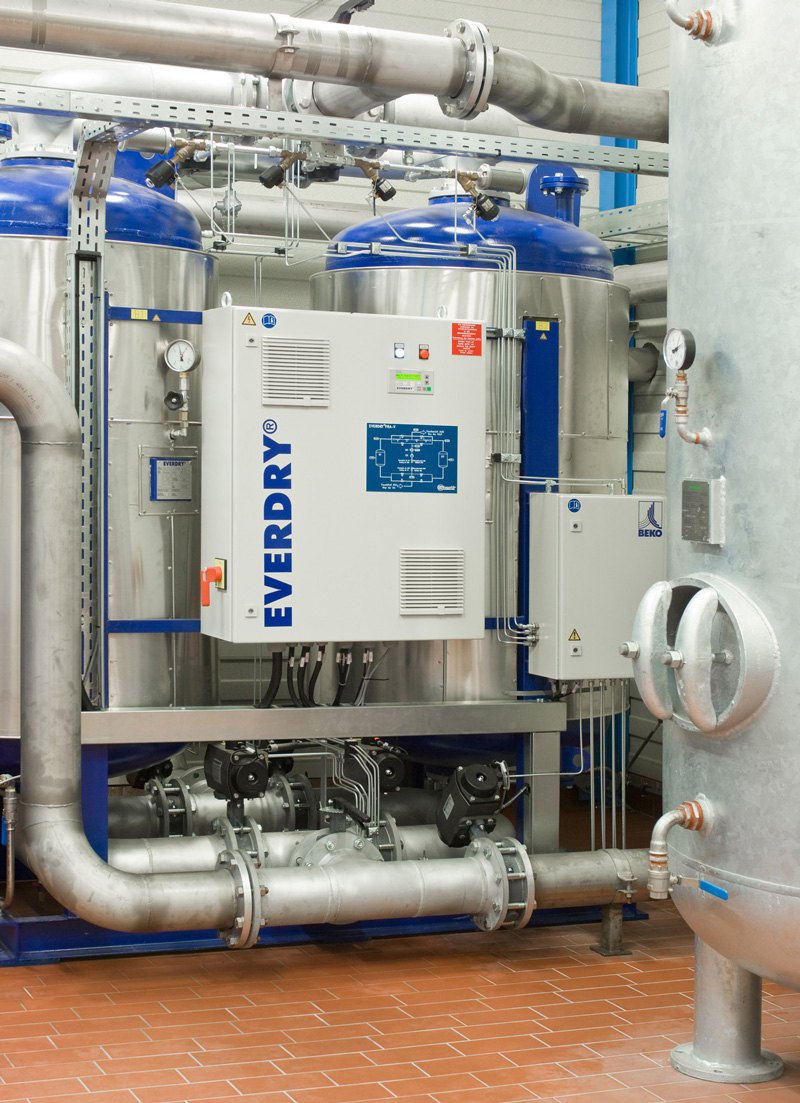Quality assurance in a cardboard factory
| Industry: | Packaging, paper |
| Customer/Location/Year: | Delkeskamp, Nortrup (Germany), 2008 |
| Use of compressed air: | Control air, process air, condensate technology |
| Installed products: | EVERDRY, BEKOSPLIT |
This industrial sector is more than a cardboard facade: more than 100 factories with approximately 19,000 employees specialize in this field, producing and processing corrugated cardboard in Germany. Compressed air and its processing plays a central role in the production process. In particular, moisture in compressed air would have serious consequences for plants, raw materials and final products.
With an annual production of approximately nine billion square meters of corrugated cardboard, Germany ranks in first place in Europe, and in fourth place in the world behind the USA, China and Japan. Meanwhile, nearly three quarters of all goods transported in Germany are in transit in corrugated cardboard, and almost 30 per cent of all filled corrugated cardboard packaging crosses the border on its way to the user. Big business with wide repercussions, meaning that it is accordingly of great importance to the entire German political economics.
One of the pioneers, pacemakers and top performers in this industrial sector is Delkeskamp Verpackungswerke GmbH in Nortrup, Lower Saxony, in Germany. Founded already in 1896 as a cardboard-box factory, the company today not only produces in the Nortrup parent plant, but also in further manufacturing plants in Hanover and in the Czech city of Odry, where paper, corrugated cardboard and foamed plastic for many types of packaging are produced.
Closed circuit production
The parent material to produce corrugated cardboard is the corrugated-cardboard raw paper. The lion’s share of the raw paper the company needs for production is manufactured by Delkeskamp GmbH itself in the Nortrup factory. In this respect, this site is the first link of a closed-circuit production and, therefore, of decisive importance for the functional performance and profitability of the entire Delkeskamp manufacturing structure. Besides purely production-related advantages, the in-house manufacture of the corrugated-cardboard raw paper ensures the company’s maximum independence from the procurement market.
And Delkeskamp generally likes to stand on its own two feet. In Nortrup, even the vapor required to produce paper is generated in a company-owned power plant by means of modern gas turbines. During this process, the amounts of electricity produced exceed internal requirements by far, and the excess electricity is fed into the public network. In this manner, the company is not only energyindependent but, moreover, is a recognized energy provider in Lower Saxony.
Besides the unconditional process reliability regarding the in-house manufacturing, the company has a certain responsibility for the people living in that region. Responsibilities that need to be fulfilled. One of the cornerstones for this is the stable and qualitatively high-grade supply of compressed air to the factory – a decisive energy carrier for the production in many respects.
Compressed air is the crucial energy carrier
In Nortrup, three - actually four - industrial branches which are provided with compressed air. These are mainly the paper mill, the corrugated-cardboard production and the plastic-foam works. A further but significantly lower share is allotted to the company-owned power plant.
Without compressed air, virtually nothing would move at Delkeskamp. To understand this, one only needs to imagine the roughly-outlined production processes in the three production divisions.
The corrugated-cardboard raw paper which, in the first step, is made from waste paper in gigantic state-of-the-art production plants, is heated and moistened during the first stage of cardboard manufacturing. In this manner, it attains the elasticity required to be shaped. In the following step, the paper is passed under pressure and under the influence of heat between two gear-wheel-like - engaging fluted rollers. In the first instance, the corrugated paper is adhered to the inner paper web from above and then to the outer paper web from below. The corrugated cardboard is now able to develop its optimum protective effect.
In fully-automated work processes, folding boxes, die-cut packages, and padded inner packaging and displays are produced out of the corrugated-cardboard formats. All this is moved or controlled via reams of pneumatic systems and via controllers and sliders operated by compressed-air. If something gets stuck in this precisely-tuned manufacturing sequence, the production quota and, above all, the manufacturing quality will immediately be affected.
Most important: dry compressed air
What Delkeskamp needs above all, besides the continuity in supply, is dry compressed air. Moisture introduction via compressed air would be pure poison for our pneumatic plants and for the products. As far as compressed-air drying is concerned, they must play it absolutely safe.
However, humid compressed air is certainly not only a risk for paper and corrugated cardboard. Dryness is also mandatory in the third Delkeskamp production division, the manufacturing of plastic foam. Here, pre-formed parts, individually designed for diverse packages, are manufactured out of expanding polystyrene (EPS). The material commonly known as styrofoam is called Denopor at Delkeskamp and completes the seamless packaging concept of the manufacturer. In this division of the works, compressed air is required, amongst other things, for the operation of the blow-moulding machines, the moving of operating cylinders, and the function of valves. Furthermore, it is used to remove the shaped parts from the machines. As the finished Denopor parts that are blown out of the moulding machine by means of compressed air are stored in an unheated warehouse, they must be absolutely dry. This is because, although otherwise very resilient, this material is very sensitive to frosty temperatures. Moisture will, by nature, increase this sensitivity even further. Therefore, dryness is at the top of the priorities list of compressed-air supply for Delkeskamp Verpackungswerke GmbH. This also applies to the extension of the compressed-air system in the Nortrup parent plant
Higher compressed-air demand subsequent to the expansion of the works
As regards the performance, the previous compressed-air station in the so-called “cellar of compressors" was unable to keep pace with this growth. The five compressors which were installed there, plus the downstream ad-sorption dryer, urgently needed support. And one of the devices which had been a “doubtful case" for a long time already was finally to be sent into retirement: the static oil/water separator did not always work according to Delkeskamp’s wishes. After an intensive market analysis, the search for a state-of-the-art solution to this problem led Delkeskamp to a contact which was completely new to him at that time: BEKO TECHNOLOGIES GmbH, the German compressed-air system provider.

This company, domiciled in Neuss on the Rhine and operating throughout the world, boasted the right technology in its product line: the BEKOSPLIT splitting system for the separation of oil-water emulsions.
BEKOSPLIT splitting systems purify emulsified condensates which occur under unfavorable basic conditions or with certain lubricant-compressor combinations. Besides compressed-air condensate, other types of oil-contaminated industrial wastewater can be processed as well. Water-insoluble organic contaminations, such as oils, plant or animal fats, and a multitude of solid contaminations are removed from the water. Furthermore, any heavy metals, dirt and paint particles are reliably adsorbed. In this process, the BEKOSPLIT principle is more effective than ultrafiltration: no aggressive cleaners are required and less energy is used. The investment requirements are extremely reasonable and extended maintenance intervals will enhance profitability even further.
A system proves itself
But this contact with BEKO TECHNOLOGIES, the compressed-air specialist, was extended. Delkeskamp quickly recognized that with BEKO TECHNOLOGIES, they had found a partner with a similar outlook. A partner with a comprehensive thinking process who developed coherent overall concepts. Things started to get exciting.
In particular, when BEKO TECHNOLOGIES suggested also reconsidering the compressed-air drying subject which, for Delkeskamp, was such a sensitive issue. Regarding profitability, for example. And when BEKO TECHNOLOGIES even went as far as to suggest transferring processing, for which up until then only adsorption dryers had been employed, to a large extent also to refrigeration dryers, the doors fell shut again for a moment.
Initially, this suggestion was tantamount to a palace revolution for Delkeskamp. They shook at the foundations of a dogma, since they confided solely in the principle and the reliability of adsorption drying for the design of their plants. On the other hand, the idea of a refrigeration dryer was extremely tempting, considering the energy balance of this method, which was far more favorable compared with an adsorption dryer.
Exactly the right challenge for the system provider BEKO TECHNOLOGIES. Within a few days, a coherent concept for a redundantly structured combination system of an adsorption dryer and a refrigeration dryer was developed for Delkeskamp. Since May 2008, this has become reality.
This system allows the packaging manufacturer, depending on requirements and peripheral conditions (e.g. the season), to employ the most reliable and the most cost-effective dryer constellation at any time. Either as a flexible combination of both methods or exclusively via adsorption drying or refrigeration drying.
As the pipes of the compressed-air system on the factory premises are installed via pipe bridges in the outer area, they are by nature subjected to strong temperature variations, depending on the season. Therefore, as a protection against post-condensation and freeze-ups in winter for example, a pressure dew point of better than minus 40 °C must be provided. To achieve highest process reliability here, the installed EVERDRY adsorption dryers by BEKO TECHNOLOGIES are equipped with the respective dew-point measuring and control units.
Meanwhile, Delkeskamp exclusively relies on BEKO TECHNOLOGIES devices as far as modern compressed-air processing is concerned. Besides the BEKOSPLIT splitting plants, EVERDRY adsorption dryers and the DRYPOINT refrigeration dryer, also CLEARPOINT filters perform their tasks at Delkeskamp.


![[Translate to United Kingdom:]](/fileadmin/_processed_/5/4/csm_Steuerluft_Fotolia_155565020_L_aa821a41ea.jpg)
![[Translate to United Kingdom:]](/fileadmin/_processed_/2/f/csm_anwendung_prozessluft_fotolia_81751618_01d8064728.jpg)